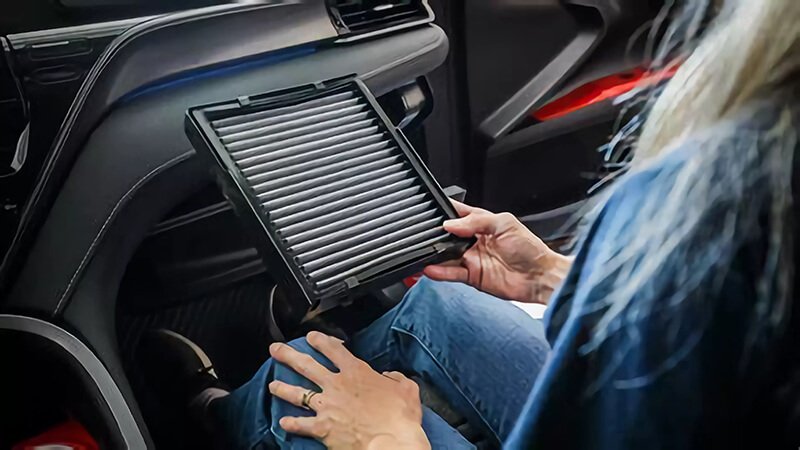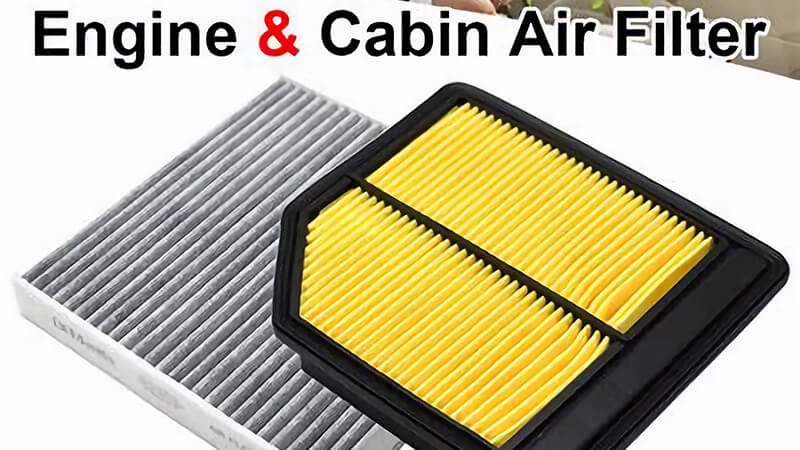When was the last time you checked your cabin air filter? It’s a part most drivers forget—until they notice a musty smell or weak airflow. Ignoring it can cause real problems, especially for passenger health and driving comfort.
Driving without a cabin air filter exposes you and your passengers to pollutants, allergens, and odors. It reduces air quality, puts strain on your HVAC system, and affects comfort. A working cabin air filter is essential, not optional.
Cabin air filters may be small, but they play a big role in every drive. In this article, I’ll explain why skipping or ignoring your cabin filter is a risk, and how using high-quality filters like the ones we manufacture at Runex Auto makes all the difference.

Can You Run Your AC Without a Cabin Air Filter?
It seems harmless to skip a filter, especially when everything seems to be working. But that quiet decision can lead to big problems later on.
Yes, technically your AC can still operate without a cabin air filter. But doing so puts your HVAC system at risk and lets unfiltered air—full of dust and allergens—circulate inside the cabin. Over time, that affects both your health and your vehicle.
Why You Shouldn’t Run Your AC Without a Filter
At Runex Auto, we’ve worked with many distributors who used to overlook the cabin filter. One UK distributor told us how their customers were returning vehicles due to weak airflow and strange smells. It turned out most of them had either removed or ignored their cabin filters.
Cabin air filters trap dust, pollen, mold spores, exhaust gases, and even bacteria. Without a filter, your HVAC system gets clogged with this debris, which:
- Reduces airflow efficiency
- Forces the blower motor to work harder
- Accelerates wear on your AC components
- Circulates dirty, potentially harmful air into your cabin
A clogged evaporator can even start producing mildew or mold—resulting in those musty odors customers complain about.
Why Runex Cabin Filters Matter
Runex Auto’s cabin filters are designed for high dust-holding capacity and long lifespan. We use multi-layer filtration media1 that captures particles as small as 0.3 microns. Plus, our carbon filters absorb harmful gases and bad odors, maintaining clean and fresh air inside the vehicle.

Is It Okay to Not Have a Cabin Air Filter?
You might think skipping the filter isn’t a big deal. Maybe it’s just one less thing to worry about. But that kind of thinking can have long-term consequences.
No, it’s not okay. Driving without a cabin air filter allows polluted air to enter the cabin, potentially triggering allergies and respiratory issues. It also causes damage to your HVAC system over time, leading to costly repairs.
Health and System Risks Without a Filter
Without a filter, everything from pollen and dust to industrial emissions can enter your cabin. That means passengers—especially children, seniors, or anyone with asthma—are breathing in harmful particles.
Let’s break it down.
Risk Table:
| Problem Area | With Filter | Without Filter |
|---|---|---|
| Air Quality2 | Clean, odor-free | Dusty, polluted, possible bad smells |
| Allergen Control3 | Filters pollen and spores | High allergy risk |
| HVAC Efficiency | Normal load | Blockages and strain on blower motor |
| Repair Costs4 | Minimal | Higher (mold, motor failure, AC repairs) |
In colder or more humid climates like the UK, the moisture buildup without proper airflow leads to mold growth. At Runex, we’ve tested and optimized our cabin filters to maintain airflow even when used under damp conditions for extended periods. This ensures consistent performance and cleaner air.

What Happens If Cabin Air Filter Is Missing?
Out of sight, out of mind? That logic might work for socks, but not for car parts—especially not the cabin filter.
If your cabin air filter is missing, dust and pollutants go straight into your HVAC system. This causes poor air quality, increased allergen exposure, and eventual system damage. You’ll notice more noise, less airflow, and odd smells.
Damage Happens Faster Than You Think
Once a vehicle runs without a cabin filter5, the HVAC system begins pulling in unfiltered air full of debris. Over time, here’s what you might experience:
Immediate Effects:
- Strong odors inside the cabin
- Higher humidity levels and foggy windows
- Sneezing or itchy eyes during the drive
After Several Weeks:
- Dust buildup on dashboard and vents
- Noisy blower motor
- Weak or inconsistent airflow
Long-Term Consequences:
- HVAC system corrosion6
- Mold formation on the evaporator
- Expensive part replacements (blower, fan motor, or entire AC unit)
At Runex Auto, we’ve engineered our cabin air filters to reduce these issues from the start. Our pleated filter media increases surface area, holding more contaminants over time. For customers in high-pollution urban areas or rural, dusty environments, our filters provide consistent protection without clogging prematurely.

How Long Can You Go Without a Cabin Filter?
If you’ve already been driving without a filter, you may wonder how long you can keep it that way. The answer depends on your environment—but the safe choice is always to install a new one as soon as possible.
Most vehicles can operate a few weeks without a cabin air filter, but it's not recommended. Even short-term exposure to dirty air affects both passenger health and system efficiency. Experts suggest replacing or reinstalling your filter every 12,000–15,000 km.
Mileage Guidelines and Maintenance Tips
Here’s a basic schedule we recommend based on customer data and our internal product testing:
| Driving Condition | Recommended Replacement Interval |
|---|---|
| Urban (polluted, high traffic) | 10,000 – 12,000 km |
| Rural or off-road | 8,000 – 10,000 km |
| Clean environments | Up to 15,000 km |
Customers often delay replacement until a smell or airflow issue arises—but by then, the damage has often begun.
Runex Filters Last Longer
Because our filters are made with high-performance synthetic fiber media7, they last longer than average paper-based filters. We also provide carbon filter options8 that absorb odors, cigarette smoke, and even NOx gases.
For our UK distributor, switching to Runex cabin filters9 not only reduced customer complaints, but also minimized returns and saved them thousands in warranty costs.

Conclusion
Skipping your cabin air filter10 may seem harmless, but the risks add up fast. Poor air quality, allergens, strange odors, and HVAC damage all stem from that one missing part. At Runex Auto, we design our cabin filters to deliver clean air, durability, and protection from day one. Whether you’re a daily city driver or operating a fleet of vehicles, don’t overlook this small but vital component. Protect your passengers, protect your systems—replace your cabin filter regularly with one you can trust.
-
Learn about advanced filtration technologies that enhance air quality and protect your health while driving. ↩
-
Understanding the impact of air quality can help you appreciate the importance of cabin filters for health and comfort. ↩
-
Explore how effective cabin filters can significantly reduce allergens, making travel safer for sensitive individuals. ↩
-
Learn about the financial implications of neglecting air quality, which can lead to costly repairs and maintenance. ↩
-
Explore the importance of cabin filters in maintaining air quality and vehicle performance. ↩
-
Learn about the impact of HVAC corrosion on your vehicle and how to prevent it. ↩
-
Explore this link to understand how high-performance synthetic fiber media enhances filter longevity and efficiency, ensuring better air quality. ↩
-
Learn how carbon filter options can effectively absorb odors and harmful gases, improving your vehicle's air quality and comfort. ↩
-
Discover the unique benefits of Runex cabin filters, including odor absorption and reduced customer complaints, making them a smart choice for vehicle maintenance. ↩
-
Find the best OEM Cabin Air Filter from Runex Auto,, clicking this link to get your best product for your businness. ↩













